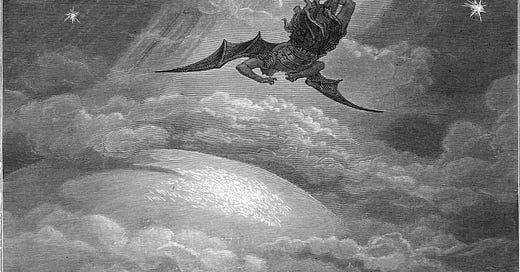Today is the feast of Michael, Gabriel, and Raphael, the only angels named in the Bible. I think most people recognize Gabriel as the angel who announced the birth of Jesus to Mary. Raphael appears in Tobit, a story we read back in June.1
And Michael, of course, is the star of today’s first reading, when he defeats Satan in a great battle. This and much of Genesis form much of the inspiration for John Milton’s Paradise Lost, an epic poem which some people interpret as depicting Satan as the good guy? Which is just…
The first time I read it, I had the same reaction as this guy: Are we reading the same book? Yeah, Milton gives Satan some great lines, “Better to reign in Hell than serve in Heaven,” but even that one is really a warning—
As TV Tropes puts it, “While what Satan says is at times stirring and convincing, it's only possible to see him as a ‘hero’ if one only listens to what he says and completely ignores what he actually does.”
Reading it this way is basically the opposite of the exegesis we discussed yesterday—eisegesis, or reading your own ideas and meaning into a work, rather than the other way around. I’m afraid this confusion, or outright glorification of the Devil himself, is a sign of the degradation of our culture, except it’s been going on since William Blake and the Romantics of the 18th century.2 So maybe it’s just more of a reflection of our fallen world than anything unique about modernity.
Reading 1
Rv 12:7-12ab
War broke out in heaven; Michael and his angels battled against the dragon. The dragon and its angels fought back, but they did not prevail and there was no longer any place for them in heaven. The huge dragon, the ancient serpent, who is called the Devil and Satan, who deceived the whole world, was thrown down to earth, and its angels were thrown down with it.
Then I heard a loud voice in heaven say: "Now have salvation and power come, and the Kingdom of our God and the authority of his Anointed. For the accuser of our brothers is cast out, who accuses them before our God day and night. They conquered him by the Blood of the Lamb and by the word of their testimony; love for life did not deter them from death. Therefore, rejoice, you heavens, and you who dwell in them."
Michael comes across as pretty awesome in this passage, which is why it’s interesting to note that his name translates to “Who can compare with God?” Despite all of his accomplishments, Michael is the embodiment of humility, pretty much the opposite of Satan in Paradise Lost.
Responsorial Psalm
Ps 138:1-2ab, 2cde-3, 4-5
R. In the sight of the angels I will sing your praises, Lord.
I will give thanks to you, O LORD, with all my heart,
for you have heard the words of my mouth;
in the presence of the angels I will sing your praise;
I will worship at your holy temple
and give thanks to your name.
R. In the sight of the angels I will sing your praises, Lord.
Because of your kindness and your truth;
for you have made great above all things
your name and your promise.
When I called, you answered me;
you built up strength within me.
R. In the sight of the angels I will sing your praises, Lord.
All the kings of the earth shall give thanks to you, O LORD
when they hear the words of your mouth;
And they shall sing of the ways of the LORD
"Great is the glory of the LORD
R. In the sight of the angels I will sing your praises, Lord.
The psalmist gives God due praise. He doesn’t deserve to be rescued, yet God did it all the same, out of kindness. He praises God publicly, in front of the whole world and all of heaven, so that they know God is the one who is to be glorified.
Alleluia
Ps 103:21
R. Alleluia, alleluia.
Bless the LORD, all you angels,
you ministers, who do his will.
R. Alleluia, alleluia.
Angels are different than people—pure spirit, instead of embodied souls (or ensouled bodied, which I believe are the same?). Yet they are still an example for us, in the way they praise God. At every mass, the priest calls on us to sing with them—“And so, in company with the choir of angels, we praise you, and with joy we proclaim:
Holy, Holy, Holy Lord God of hosts.
Heaven and earth are full of your glory.
Hosanna in the highest.
Blessed is he who comes in the name of the Lord.
Hosanna in the highest.
The next time you sing the Hosana at mass, picture Michael, Raphael, Gabriel, and all their friends singing along.
Gospel
Jn 1:47-51
Jesus saw Nathanael coming toward him and said of him, "Here is a true child of Israel. There is no duplicity in him."
Nathanael said to him, "How do you know me?"
Jesus answered and said to him, "Before Philip called you, I saw you under the fig tree."
Nathanael answered him, "Rabbi, you are the Son of God; you are the King of Israel."
Jesus answered and said to him, "Do you believe because I told you that I saw you under the fig tree? You will see greater things than this." And he said to him, "Amen, amen, I say to you, you will see heaven opened and the angels of God ascending and descending on the Son of Man."
Didn’t we just read this a month ago? And also in January?
Obviously, we’re talking about angels today. Usually, when angels show up in the Bible, they appear to be human. Occasionally, someone like Jacob sees an entire host of angels in their heavenly state.3 Jesus promises Nathanael that he’ll be blessed with that sight.
We can hope that we, too, will join them in Heaven with the angels, through faith and God’s grace.
On the last day of the series, I went on a rant about someone radically misinterpreting a story. Let this be your warning that it’s about to happen again.
Closer to our time, C.S. Lewis wrote a book-length critique of this view, although I haven’t personally read it yet.





